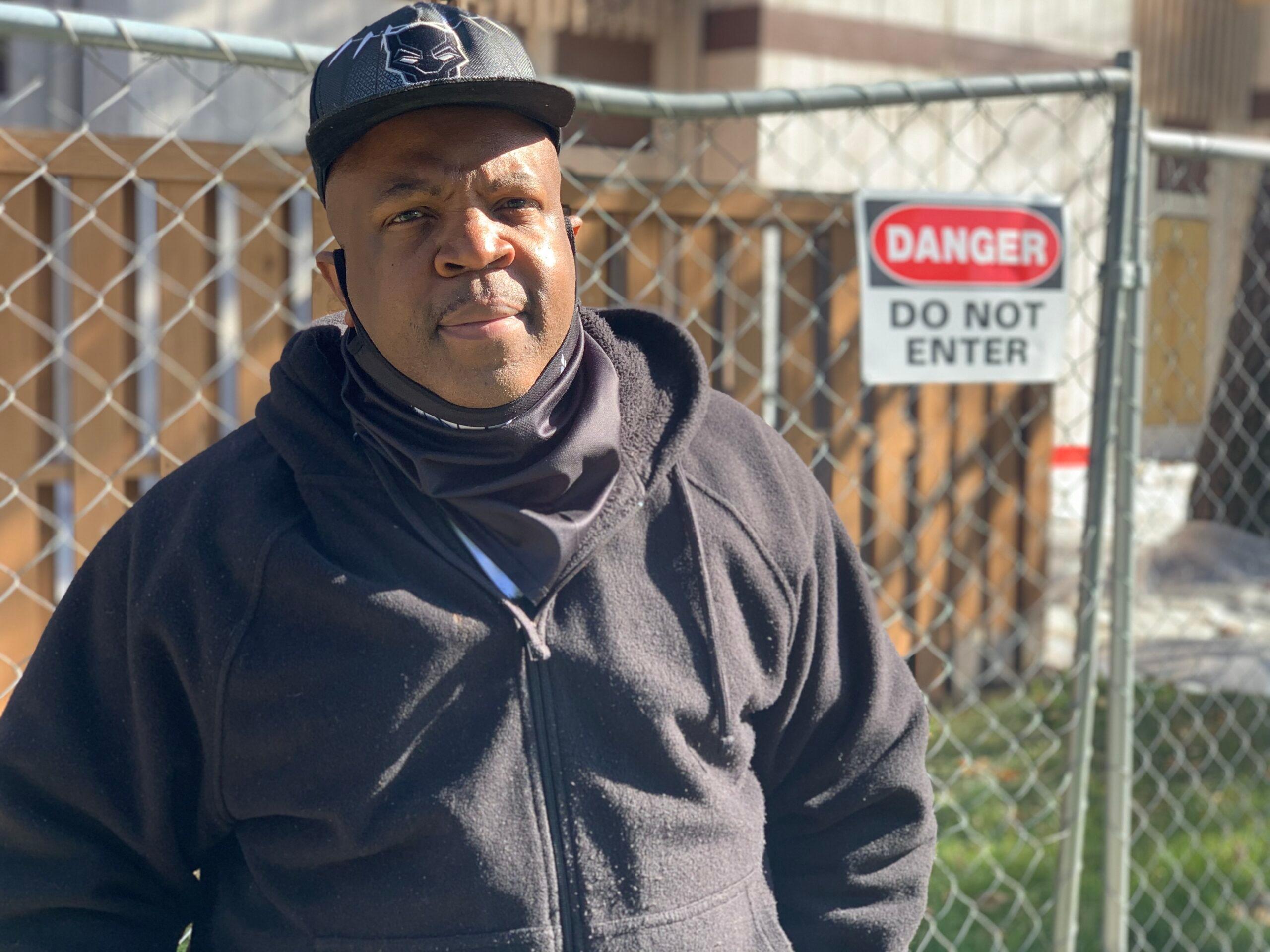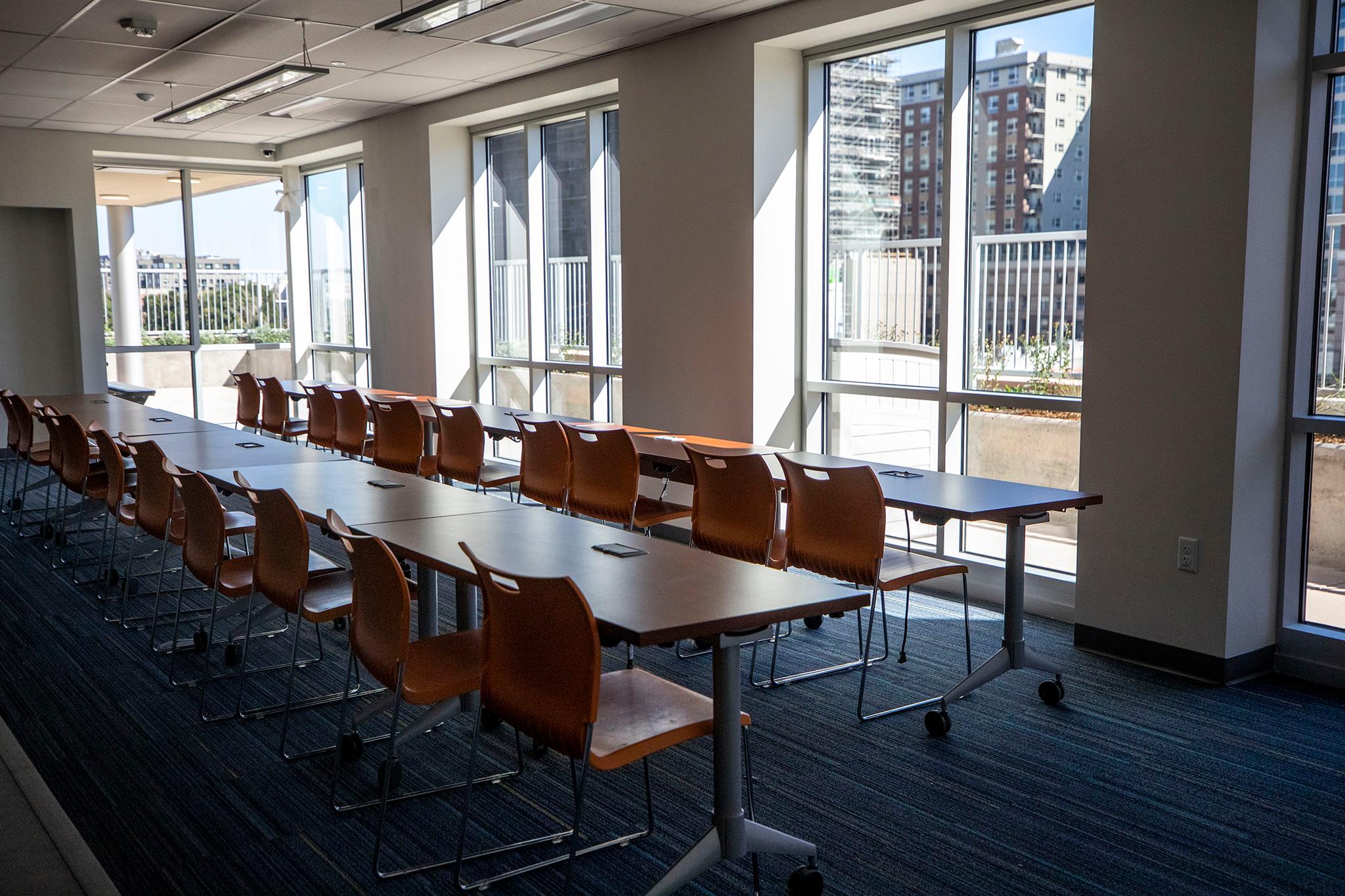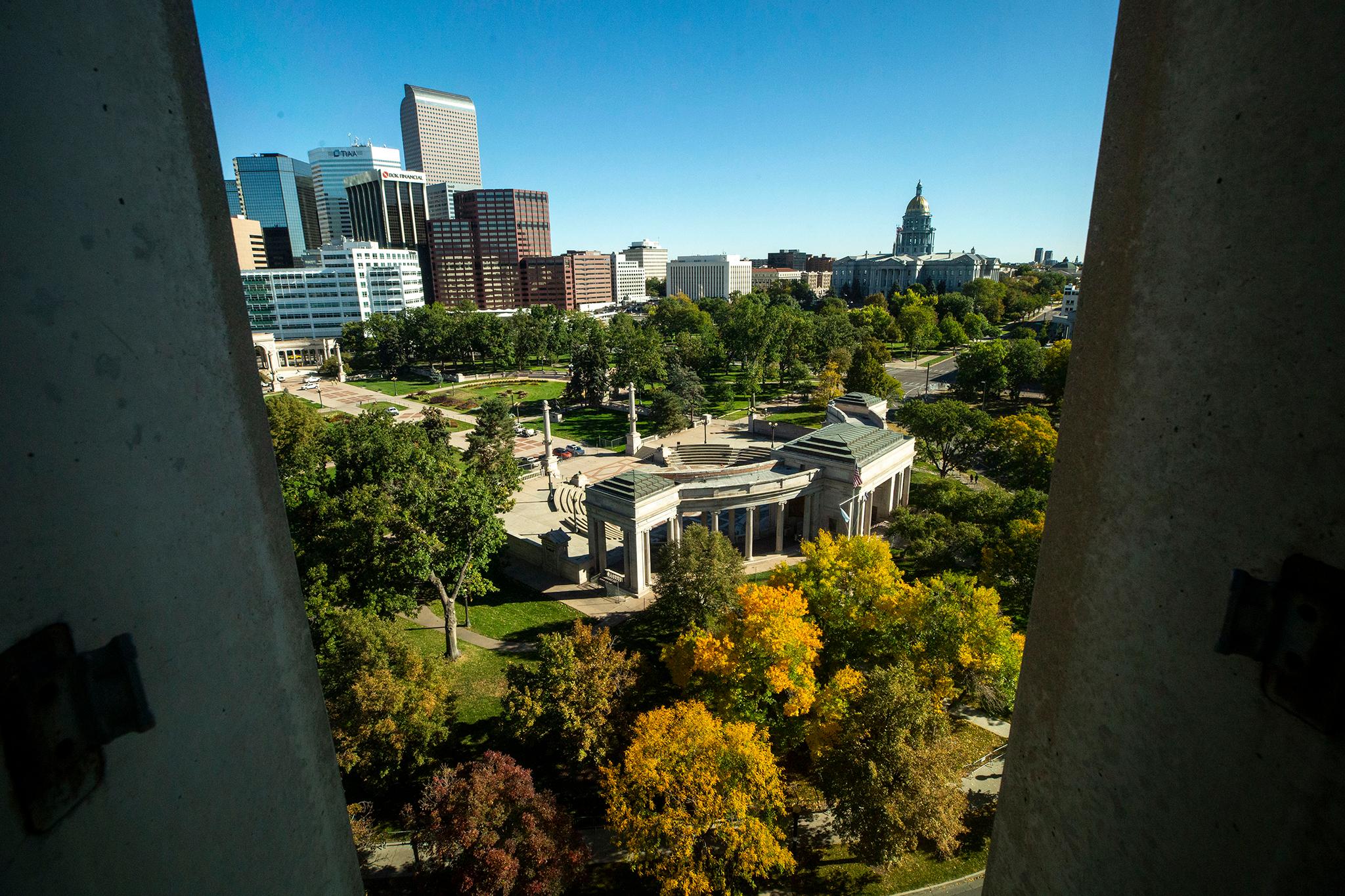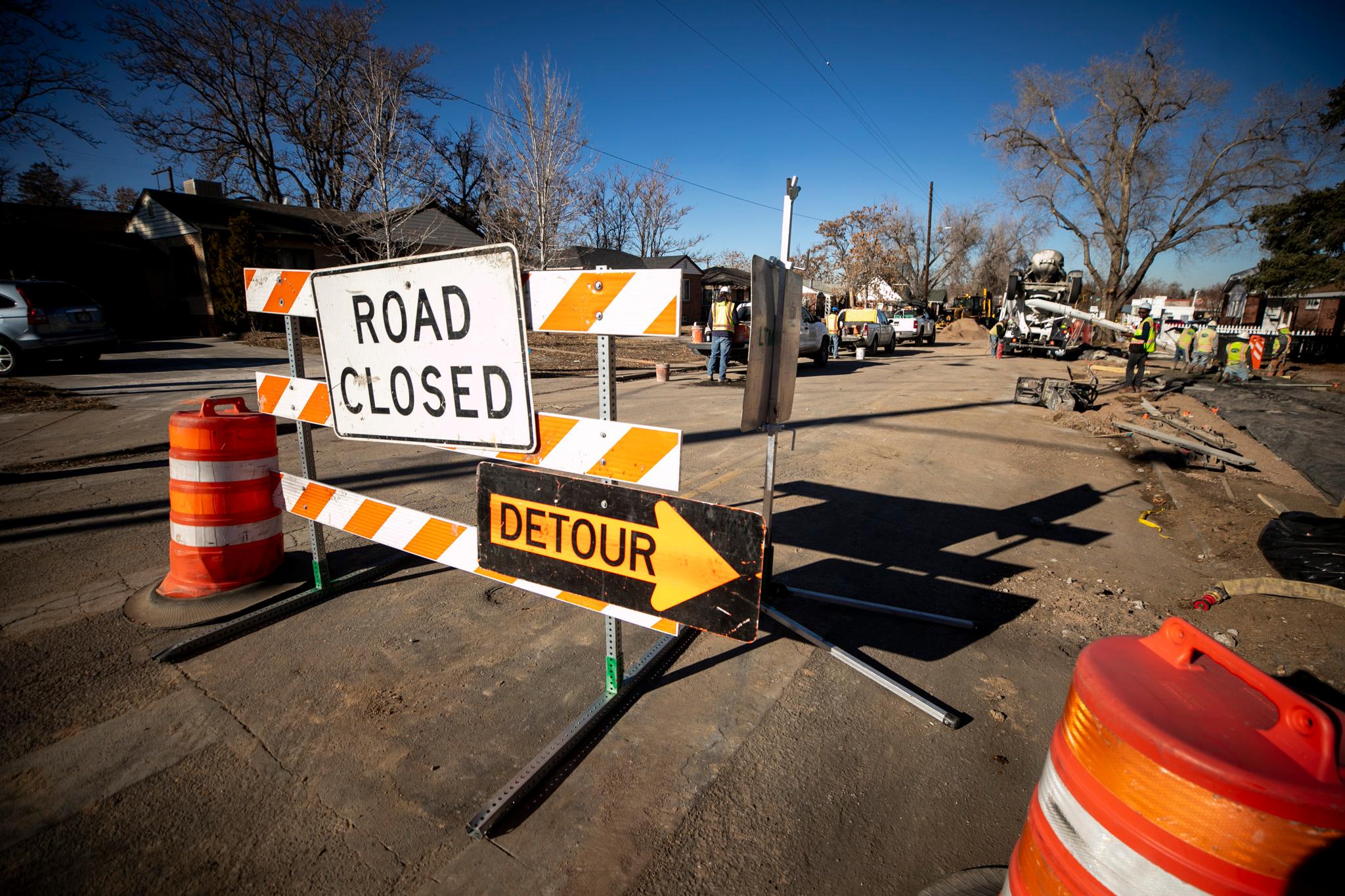Nursing assistant Constance Winn had just come home from work. She smelled smoke and opened the door to her third-floor apartment.
"Dark smoke rushed in," said Winn, who would learn later that a fire had broken out in an apartment two doors from hers on that summer afternoon.
Winn grabbed her keys and cell phone, took her daughter and granddaughter by the hands, and ventured into the smoky hallway. The three made it safely down the stairs and out of the building, one of 18 set amid trimmed lawns dotted with pine trees in the Pine Creek Apartments complex in southeast Denver. According to a Denver Fire Department report on the blaze, some of Winn's neighbors jumped from their apartments to escape, and three people were taken to the hospital with minor injuries.
Winn and her family stayed with her sister the night of the fire, Aug. 8. Winn checked in with the Pine Creek management office daily for several days and was told it was unsafe to return to her apartment, even to collect clothing and other belongings. Within a few days, Winn was able to get a hotel room through the Red Cross. She eventually found a new apartment -- at twice the $595 monthly rent she'd been paying at Pine Creek.
As Winn worked to rebuild her life, she kept in touch with staff in the Pine Creek management office, making sure they had her new address and knew that her mobile-phone number had not changed. She said she was asked to sign a document to get back her deposit and a portion of the August rent. She refused to sign because she did not understand the document. Winn, who is from Liberia, said she is cautious because she is unfamiliar with U.S. legal issues.
The document included a clause concerning the possibility that her old home would remain unsafe to enter. Under that circumstance, the document proposed giving the landlord permission to enter her apartment "and remove and dispose of any and/or all of the tenant's remaining personal property in any manner chosen by (the) landlord or landlord's agent." A week or so after refusing to sign the document, an envelope from Pine Creek reached Winn at her new apartment. It contained a check in the amount of her deposit and part of August rent, and a notice that she needed to move out of the Pine Creek apartment she had not been in since fleeing the fire in August.
Winn cashed the check. "We need food," she said.
Winn was putting the fire, memories of which still cause her to choke up, and her time at Pine Creek behind her when she got a call from a stranger on a Sunday night last month. The caller asked Winn whether she was aware that Pine Creek had started eviction proceedings against her and several of her neighbors, and that a judge was to hear her case in Denver County Court the next morning. Winn had been unaware and was shocked.
"Why would somebody take me to court? I didn't do anything to them. I didn't start the fire," Winn said. "I paid my rent. I lived there six years. I work to support my child, myself."
The Sunday caller was a member of the Housing Justice Committee of the Denver chapter of the Democratic Socialists of America. Committee members who track evictions in the court system had seen what struck them as an unusual number involving Pine Creek tenants. They set out to track down the tenants involved to try to find out more information. The caller explained to Winn that she could attend her hearing by calling in, an alternative to appearing in person that had been adopted as part of the court's response to the pandemic. Winn said that during the telephone hearing she asked the judge why she was being evicted. He advised her to get a lawyer, which she was able to do with help from the Denver Democratic Socialists of America.
The democratic socialist group has identified 25 eviction cases stemming from the Pine Creek fire. Winn and other tenants who fled their apartments are trying to understand why they face eviction, which could affect their credit ratings and be used by landlords in the future as a reason not to rent to them. Some former Pine Creek residents are fighting back in court with a countersuit.
(Tenants who can show their ability to pay rent has been affected by the pandemic are covered by federal and state moratoriums on evictions declared because of COVID-19. The moratoriums have slowed but not stopped eviction filings.)
Pine Creek management is represented in the eviction cases by lawyers for Tschetter Sulzer, which calls itself "Colorado's No. 1 landlord firm" and a specialist in evictions. Rachel Griffin, a Tschetter Sulzer lawyer who has appeared on Pine Creek's behalf in several of the eviction cases stemming from the fire, said in an email that "due to the ongoing litigation we are unable to provide you with a comment at this time." Charles Olden, identified in state documents as the Denver contact for the Canadian company that owns Pine Creek, did not return calls and emails seeking comment. A Denverite reporter called Capital Management's offices in Alberta and was transferred to a woman who, upon hearing the reporter identify herself, said, "no comment" and hung up.
Court documents in the eviction cases filed by Tschetter Sulzer lawyers appear generic, accusing tenants of either refusing to pay amounts owed or comply with other terms of the lease and continuing to "wrongfully hold possession of the premises in violation of the lease."
Nothing in the eviction filings indicates that the tenants involved had already left Pine Creek and had been reimbursed security deposits and portions of their rent.
Jason Legg, a lawyer and member of Denver Democratic Socialists who specializes in tenants' rights cases and is representing some of the former Pine Creek residents, said Tschetter Sulzer lawyers used stock eviction legalese that "doesn't tell tenants exactly why it is they're facing eviction. It lists every possible reason they might be. Why is that OK?"
By mid-November, Legg was representing six people who lived at Pine Creek before the fire. The lawyer was hoping to take on more plaintiffs in a class-action suit. Legg said that in his opinion, Pine Creek management may see eviction as an inexpensive and quick method to clear the way to start rehabilitation work on the fire-damaged building.
According to documents Denverite obtained through an open records request to the Department of Public Health and Environment, Pine Creek management called in specialists days after the fire to determine whether asbestos had been released because of the fire. Inspectors found traces of asbestos, exposure to which can cause cancer, in apartments and elsewhere in the building. Consultants hired by Pine Creek reported to the managers that a major asbestos spill had occurred.
Andrew Bare, a spokesman for the Air Pollution Control Division of the Colorado Department of Public Health and Environment, said in a Nov. 17 email to Denverite that his division had approved initial work to clean up the spill.
On Wednesday, the staccato sounds of hammers signaled that roof work was underway on some Pine Creek buildings, all three-story and clad in identical dark brown brick. But building 17, where the fire occurred, was quiet. Building 17 was fenced off, with "danger - do not enter" sign posted near the entrance. The scene was similar to what Chris Washington, a government clerical worker, found the first time he returned to his apartment after the fire.
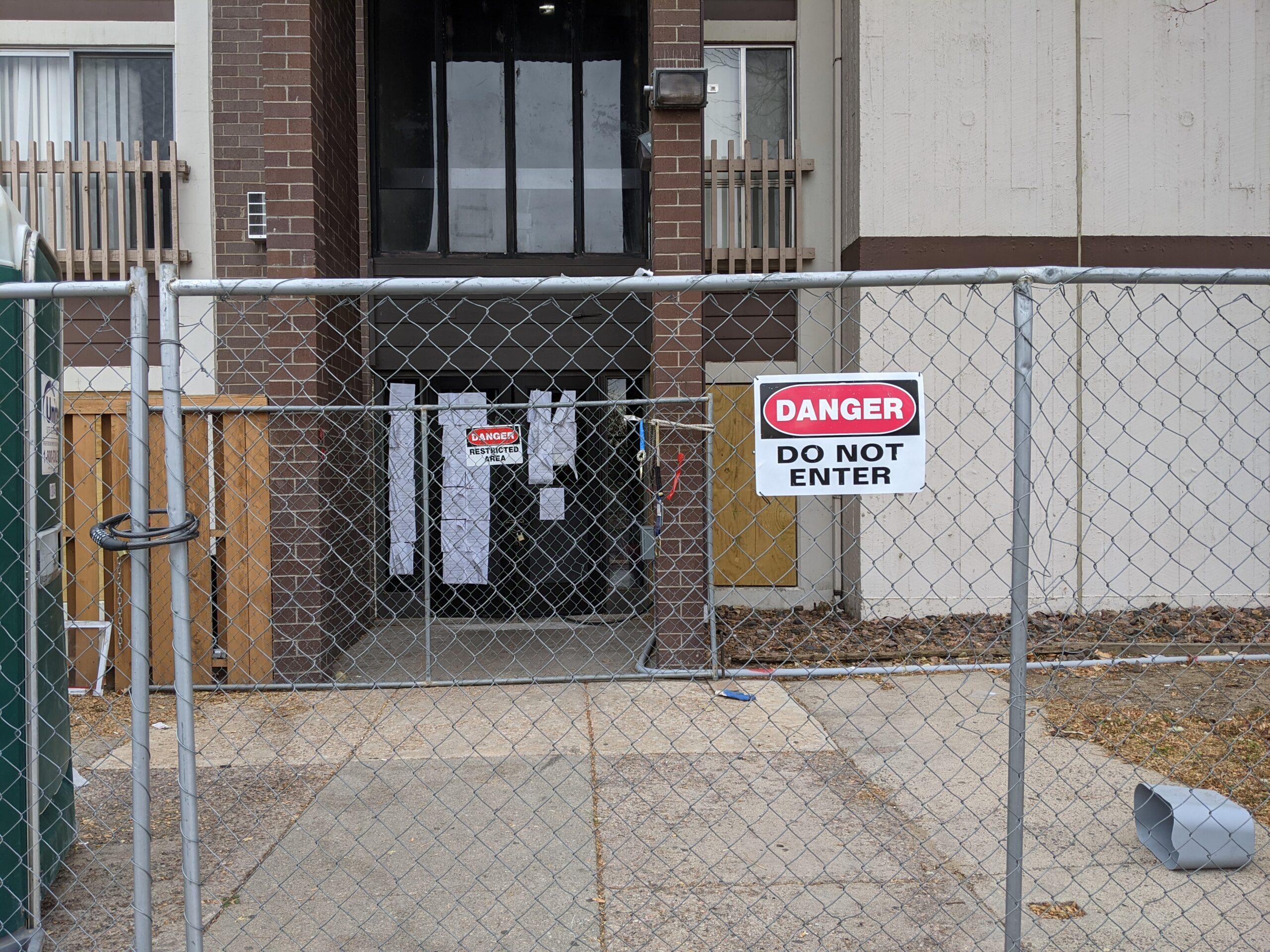
Washington was on a work trip out of state the day of the fire. He was still away a few days later when he got a call from a Red Cross worker who was the first person to tell him about the fire. The Red Cross provided Washington a hotel when he first returned to Denver. He has since relocated to an apartment that costs twice what he was paying at Pine Creek.
"I had to buy new furniture, new bed, new couch," he said.
On a visit to Pine Creek weeks after the fire, Washington peered at his old building through a chain-link fence. The building is in the back of the large complex, overlooking Ben Bezoff Park. Signs of the fire marked the outside of the building: plastic sheeting flapping from a window, singed wooden railings along a few windows. He could not get into his first-floor home of 10 years or see any of his possessions -- his clothing, his family's birth and death certificates, heirlooms such as his grandfather's hats, watches and shoes.
"I'm looking at part of me that's trapped on another side of a building, trapped inside of a building that can't come out," Washington said. "And I have no way of knowing what's what."
Like Winn, Washington got back his deposit and part of August rent. The check arrived Oct. 16. Three days later, Washington got a call from a Pine Creek resident who was at the court house. The former neighbor let Washington know he was facing eviction.
"I was in a state of confusion" at the news, Washington said. "Confused and stunned and stressed out.
"I shouldn't have to suffer with having a negative mark on my credit or ... an eviction on my rental history when I've lived here 10 years successfully," Washington said. "We were already out of the property Aug. 8 because the place was deemed uninhabitable. Why are you messing with people that are already going through a tumultuous time? It almost feels like it's a retaliation."
Like Washington, Fernando Peña wasn't at home at the time of the fire. He had spent that Saturday at a friend's home and had returned in the evening to find neighbors had been displaced and firefighters were on the scene. According to the fire department report, firefighters determined that night that the first and second floors were habitable.
Peña spent Saturday, Sunday and Monday in his first-floor apartment. Monday morning he left for his job as a metal worker at 6 a.m. When he returned that evening around 5, he found the building had been fenced off. Neighbors told him they had had no warning. No one from the management office was at the site. Documents from the state health department show an asbestos survey was conducted that day, Aug. 10.
Peña had only the clothes he'd worn to work that day and change from the money he had taken for lunch when he left that morning. He has been staying with a friend ever since.
Like Winn, Peña was later contacted by Pine Creek managers and asked, in return for getting his security deposit and part of August rent, to sign a document that referred to what would happen to his belongings if his home was deemed unsafe to enter. Like Winn, he did not sign, saying he did not understand what was being asked of him.
"All of our belongings belong to us," Peña said. "I always pay my rent on time. So they have no right to keep my belongings. No one gave us any of our belongings. We all worked hard for what we had."
Some tenants, like Kim Lertjuntharangool, signed the documents and still faced eviction proceedings.
"They said that I didn't comply with the release of my property," Lertjuntharangool said. "I did sign it."
Pine Creek later withdrew eviction proceedings against Lertjuntharangool. But she worries that the court record could still hurt her attempts to find a new place to live. She's been renting hotel rooms and has lost work as a personal caregiver as she's tried to respond to the court case and all the other stresses of losing her home.
"They were trying to say, (the eviction filing) must've been a mistake. Everything with them is a mistake," she said. "There's no way. There's no way you're going to put an eviction status on my head -- especially now that I have to find somewhere else to live -- and I've never been evicted. I've never had that record."
Though he refused to sign, Peña later received a check for his security deposit and part of August rent. Then he got a Sunday night call from the Denver Democratic Socialists informing him that he faced eviction proceedings and that a hearing was scheduled the next day, Oct. 19.
"I had no idea I was supposed to appear in court. I had never heard from Pine Creek," he said. "I don't understand. Because they don't even let us go in to get our things."
Peña spoke in Spanish, his words translated by Jessica Ramos, a legal and organizing fellow with 9to5 Colorado, an advocacy group that works on behalf of working-class families. Ramos also helped translate for Peña during his court hearing. Another tenant has needed Arabic translation.
Ramos, whose organization lobbies for tenants' rights, said she has never seen anything like what Pine Creek tenants have experienced. Neither had Heather Korth, who five years ago helped found Our Front Porch, a Denver-based nonprofit that helps find housing for people displaced by disasters such as fires. Our Front Porch helped people displaced from Pine Creek find housing.
"Rarely is a property management company super-helpful. But this scenario is just purely vindictive," Korth said. "What on earth are you trying to get from these people? They have nothing."
Lauren Echo, a member of the Denver Democratic Socialists group's housing committee, said that after seeing the unusual number of eviction cases stemming from Pine Creek, members of her group visited the complex and saw eviction notices posted on the door, behind the fence. They realized many tenants may not have been informed and set out to find as many as they could, searching the internet in some cases. Echo worries about those they have not reached, who may end up with eviction records without knowing a court has ruled.
"That's what's especially bull**** here," Echo said, adding that with an eviction record, it will be "for the rest of their lives more difficult for them to get housing. It has a permanent effect on people's lives."
Courtney Meihls, spokeswoman for Denver Human Services, said her city department worked with the Red Cross to shelter and feed Pine Creek residents after the fire. The support included referring some residents to Colorado Legal Services, Meihls said. Legg, the attorney, said some tenants have tried to represent themselves in the eviction proceedings.
Legg said the goals of his class-action suit include ensuring that former Pine Creek residents do not end up with evictions on their records. He also hopes to persuade a judge to order Pine Creek to do a better job reaching out to former residents "and making good faith and diligent efforts to get their belongings back."
Winn said she wanted Pine Creek managers to take responsibility for the trauma she and other former residents have suffered.
"They're not concerned about anything," she said. "They're not concerned about how you feel."
After this story published, we removed a references to traces of asbestos being found in specific apartments. We learned after publication that results of later testing showed that some of the apartments we referenced were not contaminated.
